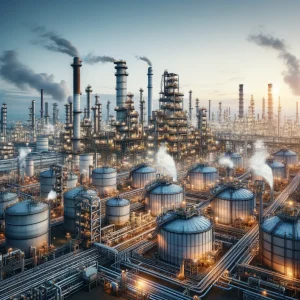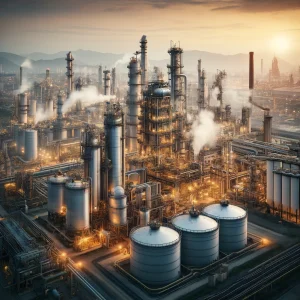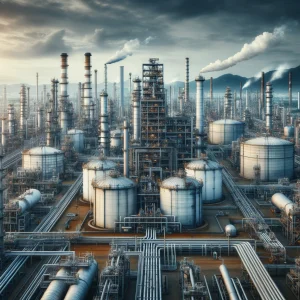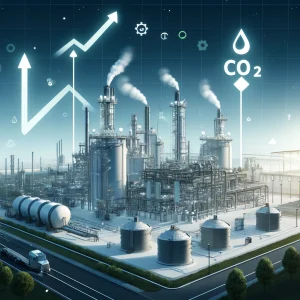Petrochemical Industry
The petrochemical industry refers to the branch of chemistry that involves the transformation of petroleum and natural gas into useful products or raw materials. These industries produce a variety of chemical compounds that are foundational to manufacturing a wide range of products, from plastics and solvents to detergents and adhesives. In this article, Petrochemical Industrial Changes in the Last Ten Years will be explored.
Technological Developments
The petrochemical industry has seen numerous technological developments aimed at increasing efficiency, reducing environmental impact, and enhancing the production of high-value chemicals. Some key technological advancements include:
Cracking Technology Improvements
Innovations in cracking technology, such as the development of more efficient and selective catalysts, have significantly improved the yield of valuable petrochemicals like ethylene and propylene. Advanced cracking methods, such as steam cracking, have also been optimized to lower energy consumption and reduce carbon emissions.
Catalytic Technologies

Advances in catalysis have been crucial for enhancing the efficiency of chemical reactions in the industry. New catalysts are more effective, selective, and durable, reducing waste and the need for harsh conditions while increasing the quality and quantity of the output.
Process Integration and Optimization
Integration of various chemical processes within a plant (known as process integration) optimizes energy use and reduces waste. Techniques like pinch analysis help in identifying the most efficient ways to use energy, thereby minimizing thermal and chemical energy consumption.
Digitalization and Automation
The petrochemical sector has been incorporating more digital technologies, including Internet of Things (IoT) sensors, artificial intelligence (AI), and machine learning algorithms. These technologies enhance monitoring and control, optimize supply chains, and predict maintenance needs, thus reducing downtime and improving safety.
Carbon Capture and Utilization (CCU)
As environmental concerns grow, technologies for capturing and utilizing carbon dioxide emissions from petrochemical plants are becoming more prevalent. These technologies aim to reduce greenhouse gas emissions by capturing CO2 and either sequestering it underground or using it as a raw material to produce other chemicals.
Bio-based Feedstocks
There is a growing shift towards using bio-based feedstocks instead of traditional fossil fuels. These renewable raw materials can be used to produce the same chemicals as those derived from petroleum but with a lower carbon footprint. For example, bio-ethanol can be dehydrated to produce ethylene.
Advanced Recycling Technologies

Chemical recycling is a significant advancement for managing plastic waste, a major product of the petrochemical industry. This technology breaks down plastics into their chemical components, which can be reused to make new plastics, effectively creating a circular economy.
These developments not only enhance the operational aspects of the petrochemical industry but also help in addressing environmental and sustainability challenges.
Market Changes
The petrochemical industry is highly dynamic, influenced by a variety of market forces, geopolitical events, and technological advancements. Here are some significant market changes and trends affecting the petrochemical industry:
Fluctuations in Oil and Gas Prices
As the primary raw materials for petrochemicals are derived from crude oil and natural gas, fluctuations in these commodity prices directly impact the industry. Changes in oil and gas supply, driven by geopolitical tensions, OPEC decisions, or shifts in production levels, can lead to significant volatility in petrochemical product pricing.
Shift Towards Sustainability
There is an increasing demand for sustainable and environmentally friendly products, which is pushing the petrochemical industry to innovate and develop more sustainable practices. This includes investing in bio-based feedstocks, improving energy efficiency, and implementing advanced recycling technologies. Regulations and consumer preferences are accelerating these shifts, potentially reshaping market dynamics.
Impact of Global Trade Policies
Trade tensions and tariffs can greatly influence the petrochemical market. For instance, tariffs imposed by countries on petrochemical products can affect global supply chains and alter production and investment decisions. The ongoing trade disputes between major economies like the US and China have had ripple effects across the global petrochemical landscape.
Growth in Developing Regions

Rapid industrialization and economic growth in Asia, particularly in China and India, have led to increased demand for petrochemical products. These regions are expanding their petrochemical capacities, which influences global market dynamics and supply chains.
5. **Technological Innovations**: Advances in technology are leading to more efficient production processes and the development of new materials that can perform better or replace traditional petrochemical products. For example, the production of lighter and more durable plastics affects demand patterns in industries like automotive and packaging.
Circular Economy and Recycling
As awareness and regulatory pressures regarding plastic waste increase, there is a growing trend towards a circular economy. This includes increased recycling rates and the development of new, recyclable materials. Petrochemical companies are investing in chemical recycling technologies that can convert waste plastics back into raw materials.
COVID-19 Impact
The pandemic has had a mixed impact on the petrochemical industry. While it initially led to a reduction in demand for certain chemicals due to slowdowns in industrial activity, there has been a surge in demand for others, such as plastics used in packaging and medical supplies.
Understanding these market changes is crucial for stakeholders in the petrochemical industry to navigate the complexities and leverage opportunities for growth and innovation.
Environmental Developments
The petrochemical industry, traditionally known for its substantial environmental footprint, has been undergoing significant changes in response to increasing environmental awareness, regulatory pressures, and consumer demand for sustainable practices. Here are some key environmental developments impacting the petrochemical sector:
Energy Efficiency Improvements
The industry has made strides in enhancing energy efficiency through advanced process design, better heat integration, and more efficient use of raw materials. This not only reduces energy consumption but also decreases the overall environmental impact of production processes.
Use of Renewable Energy
More petrochemical companies are incorporating renewable energy sources, such as wind and solar, into their operations to power their processes. This shift helps reduce reliance on fossil fuels and lowers carbon emissions associated with production.
Bio-based Alternatives
There is a growing trend towards using bio-based feedstocks, such as vegetable oils and agricultural waste, to produce petrochemicals. These sustainable feedstocks are renewable and can help reduce the industry’s dependence on crude oil and natural gas, thereby lowering the carbon footprint.
Water Management and Reduction

The industry uses significant amounts of water in various processes. New technologies and practices have been developed to reduce water usage and improve water recycling rates within facilities, leading to more sustainable water management practices.
Advanced Recycling Technologies
Petrochemical companies are investing in advanced recycling methods, such as chemical recycling, which breaks down plastics into their monomer components. These can then be repolymerized into new plastics, promoting a circular economy where materials are reused instead of discarded.
Reduction in Flaring and Venting
Flaring and venting of excess gases have been standard practices in the industry, leading to considerable emissions of CO2 and other pollutants. Recent developments include improved process control and gas recovery systems that minimize the need for flaring and venting, significantly reducing environmental harm.
Regulatory Compliance and Environmental Stewardship
With stricter environmental regulations being implemented globally, petrochemical companies are compelled to adopt cleaner technologies and practices. This includes adhering to emissions standards, implementing pollution control technologies, and engaging in environmental stewardship programs. These environmental developments represent the industry’s ongoing efforts to mitigate its ecological impact and align with global sustainability goals, making it crucial for companies to innovate and adapt continuously to stay competitive and compliant.
Pilsun
With thirteen years of brilliant history, smart managers, hardworking staff and the cooperation of subsidiaries, Pilsan Company is proud to provide equipment for the oil, gas and petrochemical industries, as well as the components needed for announcing and extinguishing fire with precise engineering. Visit our page for more information, events and articles!
Thank you for your precious time!




